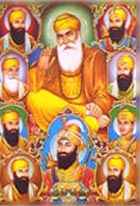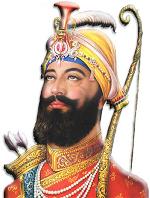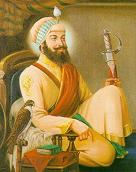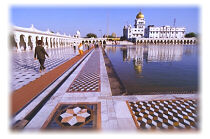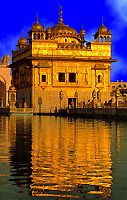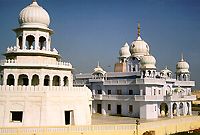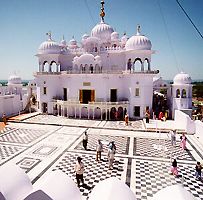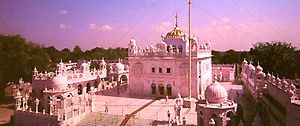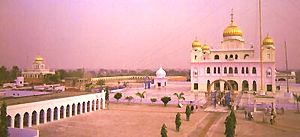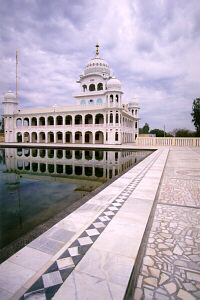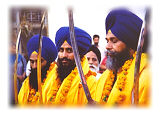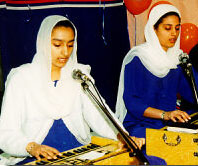[FONT=Arial, Helvetica, sans-serif]
Sikh Religious Philosophy[/FONT]
[FONT=Arial, Helvetica, sans-serif]"Realization of Truth is higher than all else.
Higher still is Truthful Living." (Guru Nanak, Sri Rag)[/FONT]
[FONT=Arial, Helvetica, sans-serif]There is only one God, he is the Creator, Sustainer and Destroyer.[/FONT]
[FONT=Arial, Helvetica, sans-serif]
"You are the Creator, O Lord, the Unknowable. You created the Universe of diverse kinds, colours and qualities. You know your own Creation. All this is your Play." (Guru Nanak, Var Majh)[/FONT]
[FONT=Arial, Helvetica, sans-serif]
"The Formless Supreme Being abides in the Realm of Eternity. Over His creation He casts His glance of grace. In that Realm are contained all the continents and the universes, Exceeding in number all count. Of creation worlds upon worlds abide therein; All obedient to His will; He watches over them in bliss, And has each constantly in mind." (Guru Nanak, Japji) [/FONT]
[FONT=Arial, Helvetica, sans-serif]
God cannot take human form.[/FONT]
[FONT=Arial, Helvetica, sans-serif]
"He neither has father, nor mother, nor sons nor brothers." (Guru Nanak, Maru) [/FONT]
[FONT=Arial, Helvetica, sans-serif]
"Burnt be the mouth that asserts, the Lord takes birth. He is neither born nor dies; neither enters birth nor departs. All pervasive is Nanaks Lord." (Guru Arjan Dev, Raga Bhairon) [/FONT]
[FONT=Arial, Helvetica, sans-serif]
The goal of human life is to break the cycle of birth's and deaths and merge with God. This can be accomplished by following the teachings of the Guru, meditation on the Holy Name and performance of acts of service and charity.[/FONT]
[FONT=Arial, Helvetica, sans-serif]
Without devotion to the Name Divine is birth in the world gone waste. Such consume poison, poisonous their utterance; Without devotion to the Name, without gain they die, and after death in transmigration wander." (Guru Nanak, Raga Bhairon) [/FONT]
[FONT=Arial, Helvetica, sans-serif]
"True life is life in God, contemplation on the Name and the society of the saints" (Guru Arjan Dev, Dhanasari) [/FONT]
[FONT=Arial, Helvetica, sans-serif]
"I shall merge in the Lord like the water in the sea and the wave in the stream. The soul will merge in God and like air I shall look upon all alike. Then why shall I come again? The coming and going is under the Will of the Lord and Realising This Will, I shall merge in the Lord" (Bhagat Kabir, Maru) [/FONT]
[FONT=Arial, Helvetica, sans-serif]
"The disciple of the True Guru (God) dwells upon the Lord through the teaching of the Guru and all his sins are washed away" (Guru Ram Das, Var Gauri) [/FONT]
[FONT=Arial, Helvetica, sans-serif]
"Our service in the world gets us a seat in the Court of the Lord" (Guru Nanak, Sri Rag) [/FONT]
[FONT=Arial, Helvetica, sans-serif]
"One known as disciple of the holy Perceptor must, rising at dawn, on the Name Divine meditate" (Guru Ram Das, Raga Gauri) [/FONT]
[FONT=Arial, Helvetica, sans-serif]
The five cardinal vices are; Kam (lust), Krodh (anger), Lobh (greed), Moh (worldly attachment) and Ahankar (pride). If one can overcome these, they will achieve salvation.[/FONT]
[FONT=Arial, Helvetica, sans-serif]
"Five thieves who live within this body are lust, anger, greed, attachment and ego. They rob us of ambrosia, but the egocentrics do not understand it and no one listens to their cries" (Guru Amar Das, Sorath) [/FONT]
[FONT=Arial, Helvetica, sans-serif]
"I am in the Refuge of the Lord; Bless me, O Lord with your Grace, so that the lust, anger, greed, attachment and ego may be destroyed" (Guru Arjan Dev, Gauri Sukhmani) [/FONT]
[FONT=Arial, Helvetica, sans-serif]
Narm Marg; emphasizes daily devotion to the remembrance of God.[/FONT]
[FONT=Arial, Helvetica, sans-serif]
"Meditation of the Lord is the highest of the deeds, through which myriads obtain release, through which the thirst (of desires) is quenched, through which one becomes all knowing, through which the fear of death goes away, through which all the desires are fulfilled, through which the dirt of the mind is cleansed and the Nectar of the Name of God is absorbed in the mind" (Guru Nanak, Gauri Sukhmani) [/FONT]
[FONT=Arial, Helvetica, sans-serif]
Rejection of all forms of blind rituals such as fasting, religious vegetarianism, pilgrimages, superstions, yoga, as well as any form of idol worship.[/FONT]
[FONT=Arial, Helvetica, sans-serif]
"Let good conduct be thy fasting." (Guru Nanak, Var Majh) [/FONT]
[FONT=Arial, Helvetica, sans-serif]
"You keep the fast to please Allah, but slay life for your relish..But you do not reflect on the Lord, Who is within you" (Bhagat Kabir, Asa) [/FONT]
[FONT=Arial, Helvetica, sans-serif]
"Only fools argue whether to eat meat or not. They don't understand truth nor do they meditate on it. Who can define what is meat and what is plant? Who knows where the sin lies, being a vegetarian or a non vegetarian?" (Guru Nanak, Var Malar) [/FONT]
[FONT=Arial, Helvetica, sans-serif]
"The world is in agony because of the filth of ego, the word is filthy because of duality; The filth of ego cannot be washed away, even if one bathes at one hundred holy places." (Guru Amar Das, Sri Raga) [/FONT]
[FONT=Arial, Helvetica, sans-serif]
"They go to holy places for a bath, Their minds are impure and bodies are like thieves; If by bath their dirt drops down, they got on themselves twice as much dirt and ego." (Guru Nanak, Var Suhi) [/FONT]
[FONT=Arial, Helvetica, sans-serif]
"Whosover controls the mind, he is a pilgrim" (Guru Arjan Dev, Maru Solhe) [/FONT]
[FONT=Arial, Helvetica, sans-serif]
"You calculate the auspicious moments, but do not realise, That God is far above the effects of these auspicious moments." (Guru Nanak, Ramkali) [/FONT]
[FONT=Arial, Helvetica, sans-serif]
"Good omens and ill omens stick to him Who does not remember the Lord." (Guru Arjan Dev, Asa)[/FONT]
[FONT=Arial, Helvetica, sans-serif]
"The way to true yoga is found by dwelling in God and remaining detached in the midst of worldly attachments." (Guru Nanak, Suhi)) [/FONT]
[FONT=Arial, Helvetica, sans-serif]
"Pandits are busy studying Puranas, Yogis are busy in yogic meditations; Sannyasis are intoxicated with ego, Tapsis are intoxicated with secrets of Tapas; All are intoxicated, none is awake, With them are thieves robbing them." (Bhagat Kabir, Basant) [/FONT]
[FONT=Arial, Helvetica, sans-serif]
"Five are the Muslim prayers; five their appointed hours, Five their names. These be the true prayers: The first is Truth, the second is lawful earning and the third is to beg the Graces of God for all, The fourth is the right intention in the mind and the fifth is the praise of the Lord." (Guru Nanak, Var Majh) [/FONT]
[FONT=Arial, Helvetica, sans-serif]
"He reads the holy books with commentaries, He does not remember God, his way of living is not flowless. He instructs and makes other people firm, But does not practise, whatever he says. Understand the substance of the Vedas, O Pandit!" (Guru Arjan Dev, Ramkali) [/FONT]
[FONT=Arial, Helvetica, sans-serif]
"The stone he calls his god, in the end, drowns him with itself... Know that a boat of stone carries one not across" (Guru Arjan Dev, Suhi) [/FONT]
[FONT=Arial, Helvetica, sans-serif]
"The stone neither speaks nor gives anything. Therefore its service is fruitless and its worship is of no avail." (Bhagat Kabir, Bhairo) [/FONT]
[FONT=Arial, Helvetica, sans-serif]
Normal Family life (Grasth) is encouraged, celibacy or renunciation of the world is not necessary to achieve salvation. The devotee must live in the world yet keep his mind pure. He must be a soldier, a scholar, a saint.[/FONT]
[FONT=Arial, Helvetica, sans-serif]
"Beauteous lady! hast not heard with thy ears, To the husband's home must thou come, nor for ever canst thou in the parental home abide" (Guru Nanak, Sri Rag) [/FONT]
[FONT=Arial, Helvetica, sans-serif]
"I that in the parents home on the Lord meditated, In the husband's home bliss have found. Blessed is the entire life of such." (Guru Ram Das, Sri Rag) [/FONT]
[FONT=Arial, Helvetica, sans-serif]
"Those known as celibates knowing not the right device, discard house and home." (Guru Nanak, Asa) [/FONT]
[FONT=Arial, Helvetica, sans-serif]
"Forsaking the household, one's mind took him to the forest, but it could not get peace even for a moment; but when it sought the refuge of the Saint of the Lord, its wanderings ceased and it returned to its own home. One abandoned his relatives and became a Sannyasi, but the craving of the mind did not cease. One's desires are not finished without the Word of the Guru, which alone can bring peace. When hatred for the world wells up in ones mind, he becomes a naked recluse, but the mind wanders ceaselessly and these wanderings do not end his desires, but when he meets the saints, he reaches the House of Mercy. Siddhas learn numerous Yogic poses; but their mind only after miraculous powers yearns. Thereby comes not to them fulfilment, content and peace of mind." (Guru Ram Das, Bilaval) [/FONT]
[FONT=Arial, Helvetica, sans-serif]
The Sikh Holy Book (Guru Granth Sahib) is the perpetual Guru, there is no place in Sikhism for a living Guru today.[/FONT]
[FONT=Arial, Helvetica, sans-serif]
"The bani is the preceptor and the preceptor is the bani, All the nectars are present in the bani: If the faithful follows the bani of the preceptor, The preceptor himself helps him in the realisation of his ideal." (Guru Ram Das, Nat) [/FONT]
[FONT=Arial, Helvetica, sans-serif]
Sikhism rejects all distinctions of caste, creed, race or sex.[/FONT]
[FONT=Arial, Helvetica, sans-serif]
"All are created from the seed of God. There is the same clay in the whole world, the potter (God) makes many kinds of pots." (Guru Amar Das, Bhairo) [/FONT]
[FONT=Arial, Helvetica, sans-serif]
"Recognise the light (of God) and do not ask for the caste, There is no caste in the next world." (Guru Nanak, Asa) [/FONT]
[FONT=Arial, Helvetica, sans-serif]
The Guru's stressed the full equality of women, rejecting female infanticide, sati (wife burning), permitting widow remarriage and rejects purdah (women wearing veils).[/FONT]
[FONT=Arial, Helvetica, sans-serif]
"We are born of woman, we are conceived in the womb of woman, we are engaged and married to woman. We make friendship with woman and the lineage continued because of woman. When one woman dies, we take another one, we are bound with the world through woman. Why should we talk ill of her, who gives birth to kings? The woman is born from woman; there is none without her. Only the One True Lord is without woman" (Guru Nanak, Var Asa) [/FONT]
[FONT=Arial, Helvetica, sans-serif]
"They cannot be called satis, who burn themselves with their dead husbands. They can only be called satis, if they bear the shock of separation. They may also be known as satis, who live with character and contentment and always show veneration to their husbands by remembering them." (Guru Amar Das, Var Suhi) [/FONT]
[FONT=Arial, Helvetica, sans-serif]
Honest labour and work (Kirat Karna) are the approved way of living ones life. It is considered honourable to earn ones daily bread through honest work and not by begging or dishonest means.[/FONT]
[FONT=Arial, Helvetica, sans-serif]
"He who eats what he earns through his earnest labour and from his hand gives something in charity; he alone, O Nanak, knows the true way of life" (Guru Nanak Dev, Rag Sarang, pg. 1245)[/FONT]
- [FONT=Arial, Helvetica, sans-serif]Vand Chhakna, sharing with others is also a social responsibility. The individual is expected to help others in need through charity.[/FONT]
- [FONT=Arial, Helvetica, sans-serif]Seva, community service is also an intergral part of Sikhism. The free community kitchen (langar) found at every gurdwara and open to people of all religions is one expression of this community service.[/FONT]
[FONT=Arial, Helvetica, sans-serif]
The Sikhism Home Page: Sikh Religious Philosophy
[/FONT]
 The Sikh Gurus preached to “recognize the Lord's Light within all, and not to consider social class or status; there are no classes or castes in the world hereafter” (Guru Granth Sahib, 349). Guru Nanak Dev Ji, the first Guru established langar, a free community kitchen. Langar is free food served in Gurdwara Sahib, which is prepared by a Sikh congregation and then consumed by them and their guests while sitting at the same level next to each other. The purpose of the langar is to eliminate any type of caste system and look to view all humans as equal. While eating langar together, there remains no difference between rich and poor, and a superior or inferior person, for all present are eating the same food at the same level. Langar is served in all Gurdwaras around the globe twenty-four hours a day.
The Sikh Gurus preached to “recognize the Lord's Light within all, and not to consider social class or status; there are no classes or castes in the world hereafter” (Guru Granth Sahib, 349). Guru Nanak Dev Ji, the first Guru established langar, a free community kitchen. Langar is free food served in Gurdwara Sahib, which is prepared by a Sikh congregation and then consumed by them and their guests while sitting at the same level next to each other. The purpose of the langar is to eliminate any type of caste system and look to view all humans as equal. While eating langar together, there remains no difference between rich and poor, and a superior or inferior person, for all present are eating the same food at the same level. Langar is served in all Gurdwaras around the globe twenty-four hours a day. 



